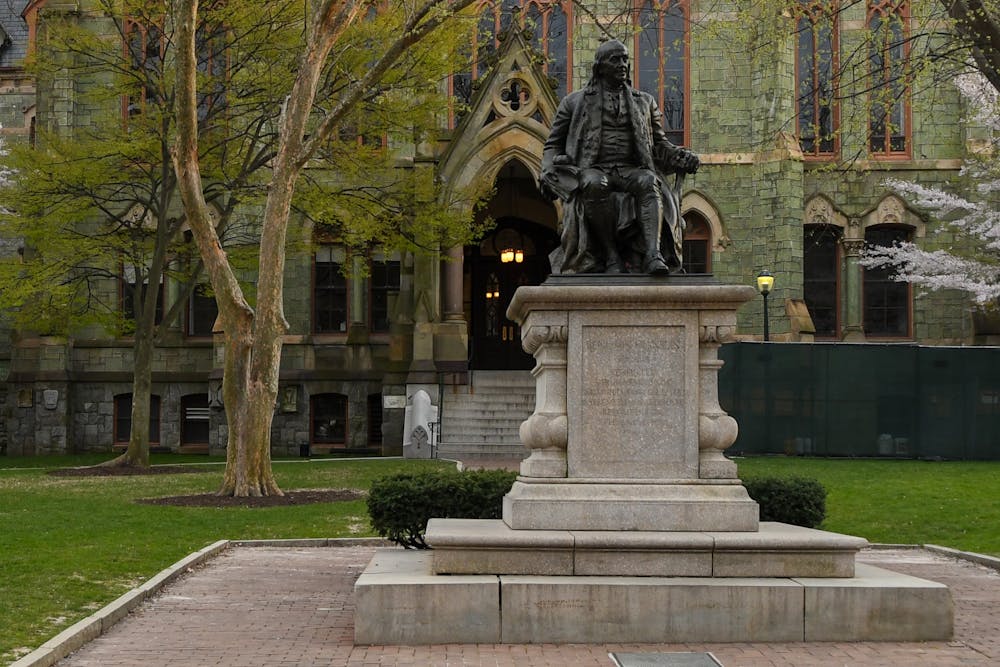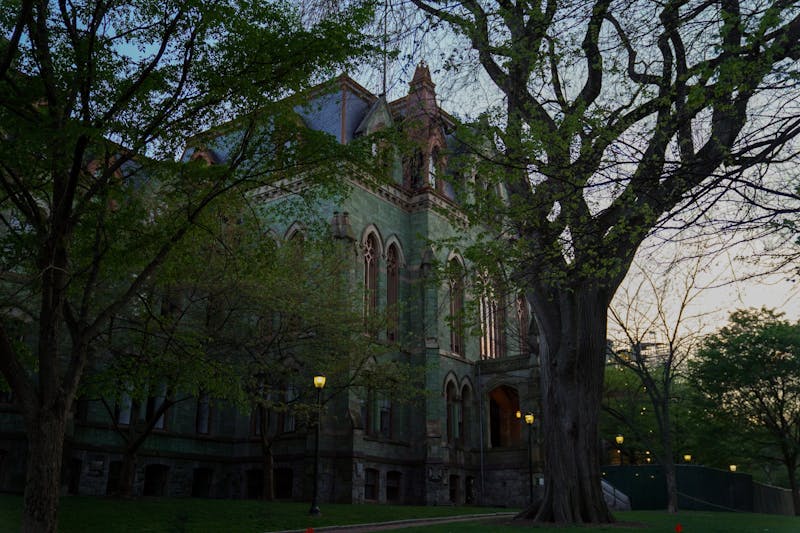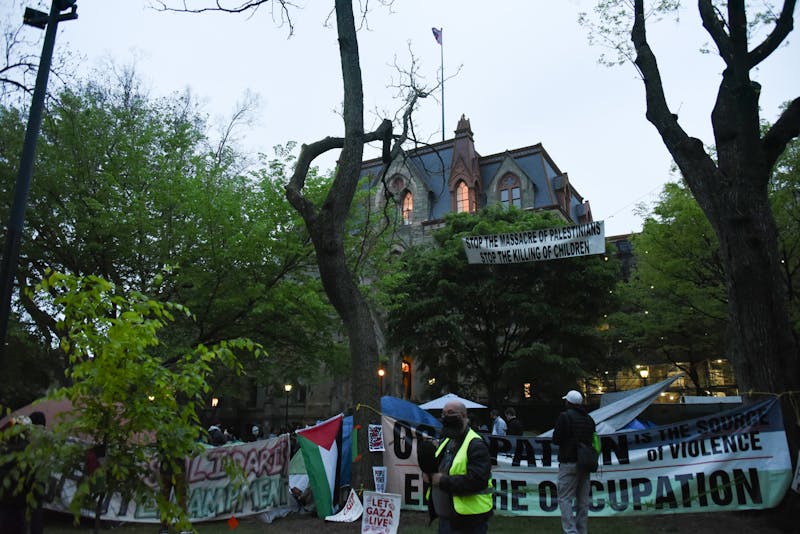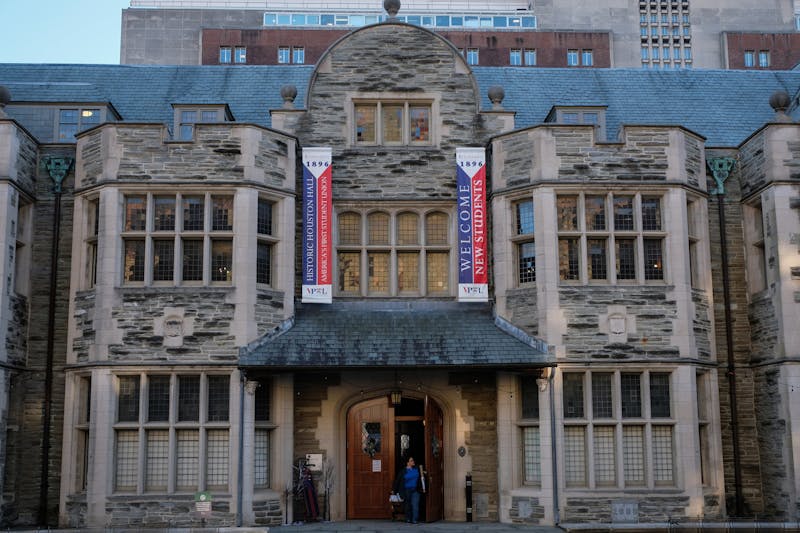
In an email sent on Thursday, Interim Penn President Larry Jameson rebuffed the results of a referendum in which the majority of participating undergraduate students voted in favor of divesting from Israel.
22% of the undergraduate student population voted on the referendum, which was organized by Penn’s Muslim Students’ Association and circulated in April by the Nominations & Elections Committee. The results were shared with Jameson on Tuesday, according to a source close to the matter. Two days later, Jameson sent an email to the MSA reiterating Penn’s opposition to the Boycott, Divestment, and Sanctions movement.
“We look forward to discussing other kinds of engagement on the topics that matter most to the Penn student body throughout the academic year ahead, and we appreciate the NEC’s role in those important conversations,” Jameson added in his email.
The referendum asked students four questions, including whether the University should divest its endowment fund from companies and organizations that “profit from, engage in, or contribute to the government of Israel’s human rights violations.” 63.6% of students who voted were in favor of divestment, while 36.4% voted against it. 655 students abstained from voting.
A University spokesperson declined to comment on the results.
In a statement to The Daily Pennsylvanian, the MSA wrote that “Penn’s student body showed overwhelming support for investment transparency and for divesting from companies associated with Israel’s documented human rights violations.”
The group added that Jameson’s email “ignore[d] the call for increased disclosure or terminating ties with Ghost Robotics.”
“This disregard for the student body’s clear mandate undermines our democratic process and fails to address significant concerns about ethical investments and transparency,” the statement read.
The referendum also surveyed students on whether the University Board of Trustees should publicly disclose all investments held through the endowment fund. 73.4% of voting students were in favor of disclosure, while 26.6% were against it.
The third question asked if Penn should terminate all partnerships and ties with Ghost Robotics, “the developers of drone-mounted robot dogs purchased by the Israeli government used to commit human rights violations.” 64.9% of students who voted were in favor of terminating these ties, while 35.1% were against.
The email was initially posted to the Instagram accounts of Penn Students Against the Occupation of Palestine, Penn Faculty for Justice in Palestine, and the Freedom School for Palestine at around 1:00 p.m. Thursday with the caption “Penn Administration finally comments non-publicly on the results of the divestment referendum voted on in April and refuses to take action on it, TWO MONTHS LATER.”
“WHO is the ‘Penn’ Larry is referring to?” the caption continued. “Because it sure isn't our student body.”
In April, when the proposed referendum was approved for a vote, a University spokesperson used the same language as the email sent today, writing to the DP that “as we have previously stated, on numerous occasions, the University of Pennsylvania does not support boycotts, divestment, or sanctions against Israel.”
In a statement on Instagram, the Penn Israel Public Affairs Committee supported Jameson's message and expressed "disappointment" with the referendum's passage.
"We raise questions addressing the delay and lack of communication of the results," the statement read. "With only 22% of the student body participating in the referendum, the resolution does not represent the views of a majority of Penn students."
The statement continued by thanking Penn administrators and trustees "for reaffirming Penn's commitment" to their partnerships with universities in Israel.
“We thank President Jameson for reaffirming that Penn will never divest from the Jewish State. We look forward to future collaboration and innovation between Penn and Israeli Universities,” they said.
“The MSA knows that many students have been silenced of their opinions on campus and prevented from engaging in meaningful dialogue about the war due to fear of doxing and physical harm that has occurred on our campus and many campuses across the country,” an MSA spokesperson previously told the DP, describing the referendum as a “democratic avenue to voice student opinions and concerns to administration without fear of outside influence.”
MSA first circulated the referendum through a petition on April 24, which quickly received the 500 votes necessary for approval by the NEC, which approved it for a ballot vote the same night. Voting — which opened on April 25 — was originally scheduled to close on May 1, but Penn's student government extended it through May 3 after Jewish students expressed criticism regarding the voting period aligning with Passover.
The results were delayed in part due to a student raising a complaint against the expedition of the approval process and claiming it revealed bias on the side of the University’s student government, citing the Fair Practices Code for Referenda that the NEC must abide by. A virtual hearing took place on June 6 to address the bias complaint.
While the results act as a measure of student sentiment, the University has no obligation to respond in accordance.
The referendum is the “highest decision making instrument of student government,” according to Article X of the Constitution of the Undergraduate Assembly. NEC bylaws state that a referendum may be called by the presentation of a petition with signatures from 5% of currently-enrolled undergraduates. NEC is responsible for administering the referendum, which requires the participation of at least 15% of currently-enrolled undergraduates to be validated.
NEC and UA representatives did not immediately respond to requests for comment. In a previous joint statement to the DP, NEC Chair Yousef Elyoussef and UA President Ria Ellendula wrote that they wanted to “give agency to students to voice their concerns to administration through a mechanism that is democratic, strategic, and fair.”
“We understand that the MSA is proposing an unprecedented referendum and we want to stand by our commitment to amplifying student voices and our responsibility to advocating for the student body,” Elyoussef and Ellendula previously wrote.
On April 25, PIPAC proposed a referendum described on Instagram as a “response to the proposed BDS referendum that went out.” Their proposal has yet to receive the 500 votes necessary for it to appear before the NEC.
The group asked four questions related to whether Penn should adhere to the Department of Education and Pennsylvania's anti-discrimination regulations; whether Penn should continue investing in Israeli companies spearheading “cancer research,” “medical breakthroughs,” and “innovative technologies to assist underdeveloped countries”; and whether the University should maintain ties with Israeli companies working on using technologies to “defend itself and free the hostages.”
Editor's note: This article has been updated to reflect that a majority of students who voted in the referendum voted in favor of divestment, not a majority of the student body overall.
The Daily Pennsylvanian is an independent, student-run newspaper. Please consider making a donation to support the coverage that shapes the University. Your generosity ensures a future of strong journalism at Penn.
Donate






